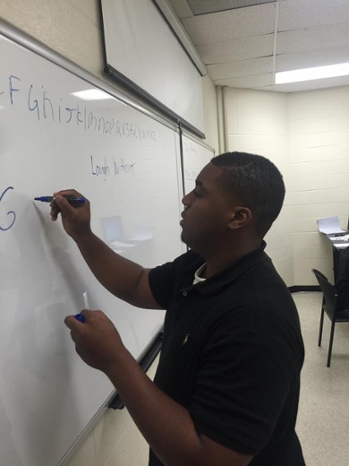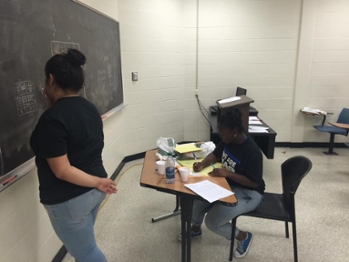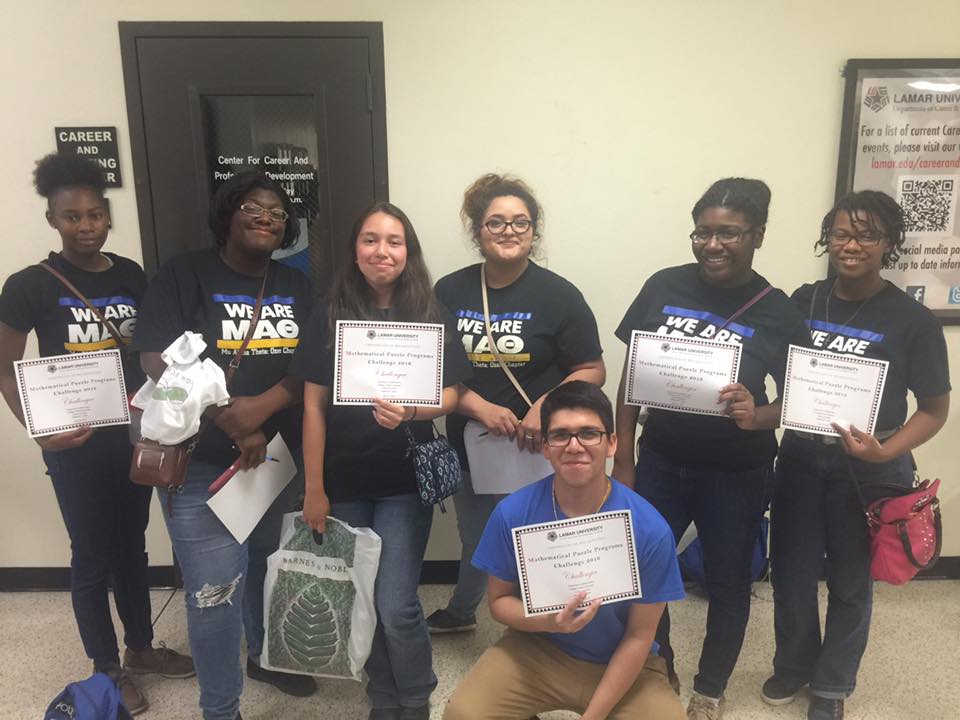Southeast Texas Youth will soon be puzzled at LU
The most puzzling scavenger hunt in Southeast Texas will take place on the Lamar University campus, April 26. Mathematical Puzzle Programs (MaPP) Challenge '19: “To Aleph-Zero and Beyond” is an annual puzzlehunt  designed to challenge middle and high school students with mathematical problem-solving abilities.
designed to challenge middle and high school students with mathematical problem-solving abilities.
Students, grades seventh through twelfth, from all over Southeast Texas will work in teams for the day-long competitive problem solving. Teams, of seven to eight students, will have at least one GPS device and a smartphone with the ClueKeeper app downloaded. The app will present puzzles and provide information about hidden clues and locations.
Each puzzle tests the team’s deductive reasoning ability and introduces concepts from mathematical fields such as cryptography, game theory or others. Teams will solve puzzles and then advance to the next puzzle location on the Lamar University campus.
MaPP was born at Lamar University but is a program on college campuses across the country and in Japan and Australia. PJ Couch, a distinguished faculty teaching fellow and assistant professor of mathematics at Lamar University, established the Lamar Mathematical Puzzlehunt in 2015. His program served as the pilot event for MaPP’s Challenges in other locations.
program served as the pilot event for MaPP’s Challenges in other locations.
“We're trying to present what contemporary math researchers do in a fun, accessible way,” said Couch.
Modeled after puzzle competitions like the MIT Mystery Hunt and DASH (Different Area Same Hunt), the MaPP Challenge engages middle and high school students with fun and engaging mathematical puzzles and games at MaPP’s host campuses, like LU.
MaPP puzzles are inspired on ideas outside the usual arithmetic-to-calculus sequence, so advanced mathematical coursework isn't necessary to enjoy the game. Unlike most math competitions, MaPP doesn’t require any knowledge beyond basic arithmetic and rewards players’ problem-solving ability over their previous mathematical background.
knowledge beyond basic arithmetic and rewards players’ problem-solving ability over their previous mathematical background.
“We want everyone to have a good time, see the Lamar University campus, interact with people on campus and at the end the day be able to say they enjoyed math,” said Couch.
For more information about MaPP at Lamar University go online to: www.lamar.edu/mappchallenge
For details about MaPP, see mappmath.org/programs/challenge.
 designed to challenge middle and high school students with mathematical problem-solving abilities.
designed to challenge middle and high school students with mathematical problem-solving abilities. Students, grades seventh through twelfth, from all over Southeast Texas will work in teams for the day-long competitive problem solving. Teams, of seven to eight students, will have at least one GPS device and a smartphone with the ClueKeeper app downloaded. The app will present puzzles and provide information about hidden clues and locations.
Each puzzle tests the team’s deductive reasoning ability and introduces concepts from mathematical fields such as cryptography, game theory or others. Teams will solve puzzles and then advance to the next puzzle location on the Lamar University campus.
MaPP was born at Lamar University but is a program on college campuses across the country and in Japan and Australia. PJ Couch, a distinguished faculty teaching fellow and assistant professor of mathematics at Lamar University, established the Lamar Mathematical Puzzlehunt in 2015. His
 program served as the pilot event for MaPP’s Challenges in other locations.
program served as the pilot event for MaPP’s Challenges in other locations. “We're trying to present what contemporary math researchers do in a fun, accessible way,” said Couch.
Modeled after puzzle competitions like the MIT Mystery Hunt and DASH (Different Area Same Hunt), the MaPP Challenge engages middle and high school students with fun and engaging mathematical puzzles and games at MaPP’s host campuses, like LU.
MaPP puzzles are inspired on ideas outside the usual arithmetic-to-calculus sequence, so advanced mathematical coursework isn't necessary to enjoy the game. Unlike most math competitions, MaPP doesn’t require any
 knowledge beyond basic arithmetic and rewards players’ problem-solving ability over their previous mathematical background.
knowledge beyond basic arithmetic and rewards players’ problem-solving ability over their previous mathematical background.“We want everyone to have a good time, see the Lamar University campus, interact with people on campus and at the end the day be able to say they enjoyed math,” said Couch.
For more information about MaPP at Lamar University go online to: www.lamar.edu/mappchallenge
For details about MaPP, see mappmath.org/programs/challenge.
Posted on Mon, April 08, 2019 by Shelly Vitanza


